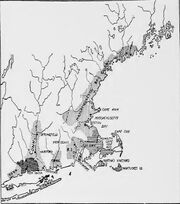| ||||||
| Capital (and largest city) |
Providence | |||||
| Other Cities | Newport and Portsmouth | |||||
| Language Official |
English | |||||
| Others | Narragansett | |||||
| Religion Main |
No established or national church | |||||
| Others | Protestantism (Baptists and Quakers), Catholicism, Judaism, Native American religions and Animism | |||||
| Ethnic Groups Main |
European (English, Scots, Welsh and Irish) | |||||
| Others | Native Americans | |||||
| Demonym | Rhode Islander | |||||
| Government | Charter Colony of the Commonwealth | |||||
| Legislature | Court of Commissioners (or General Assembly) 1643-1663, House of Deputies 1663 to date | |||||
| Lord Protector | Henry Cromwell | |||||
| President | ||||||
| Established | 1636 | |||||
| Currency | Pound sterling | |||||
All civil states with their officers of justice in their respective constitutions and administrations are proved essentially civil, and therefore not judges, governors, or defenders of the spiritual or Christian state and worship. (Roger Williams, The Bloody Tenet of Persecution, for Cause of Conscience, 1644)
The Colony of Rhode Island and Providence Plantations is colony established on the east coast of North America bordering the Atlantic Ocean. Rhode Island is bordered by New England Confederation.
History

Settled areas in New England, about 1660.
Rhode Island was founded by religious dissidents led by Roger Williams, who banished from Massachusetts for heresy. Followed later by Antinomian Controversy (Massachusetts, 1636 to 1638) and the banishment of Anne Hutchinson and followers to Rhode Island.
The proposal of Rhode Island to join the New England Confederation in 1643 was refused on the ground that it did not have charter and harbored religious dissidents. Roger Williams proceeded to England and obtained from Parliament a free charter in March 1644 incorporating Rhode Island and Providence Plantations in one colony.
In 1651, William Coddington obtained a separate charter from England setting up the Coddington Commission, which made Coddington life governor of the islands of Rhode Island and Connecticut in a federation with Connecticut Colony and Massachusetts Bay Colony. Protest, open rebellion and a further petition to Oliver Cromwell in London, led in 1653 to the reinstatement of the original charter.
In 1663 a new Commonwealth Charter was given to the colony. Within the charter are provisions far different than those found in the charters of other colonies, one of them being the recognition that the aboriginal people of the colony were the rightful owners of the land. Any land used by the colonists was to first be purchased from the natives, and later be recognized by a grant or patent from the Commonwealth a situation reversed from that found in any other colonial arrangement. Another special feature of the charter was its extensive protection of the rights of conscience. The people would elect their own officers and make their own laws, within very broad guidelines.
Religion
Rhode Island was founded as a religious sanctuary for dissidents from puritan Massachusetts. It was established that were would be a separation of church and state and freedom of conscience.
The colony became a safe haven for people who were persecuted for their beliefs, being the Baptists and Quakers the most important elements, and Jews.
Government
In 1647 a code was adopted, and by 1650 the government had been formed. The legislative powers are vested in a Court of Commissioners (or General Assembly) composed of six representatives from each town, with a the presiding officer called President. In executive matters he was to be aided by an assistant from each town. Provision is also made for a treasurer, sergeant, general recorder, attorney-general, and solicitor-general.
The charter of 1663 gave definition to the executive and legislative branches of the government, stated numbers of representatives from each town, and specifically named the Governor, Deputy Governor and the ten Assistants who would initiate the new government under its terms.
The President and assistants act as a court for important cases, which are to be tried by jury. The legislative body and the court make the circuit of the towns. The initiative and referendum are introduced, each settlement having the right to propose legislation, and acts of the Court of Commissioners are referred to the towns for ratification or rejection. Membership in a particular church is not made the basis of citizenship as in the other New England colonies.
President
- ...
- Benedict Arnold May 1657
- William Brenton May 1660
- Benedict Arnold May 1662
- William Brenton May 1666
- Benedict Arnold May 1669
Economy
The Rhode Island economy as a base in agriculture of corn, pumpkins, rye, squash and beans and fishing of cod, mackerel, herring, halibut, hake, bass and whales. Other important industries are textiles, tool making, costume jewelry and silverware.
| |||||||||||||||||||||||


